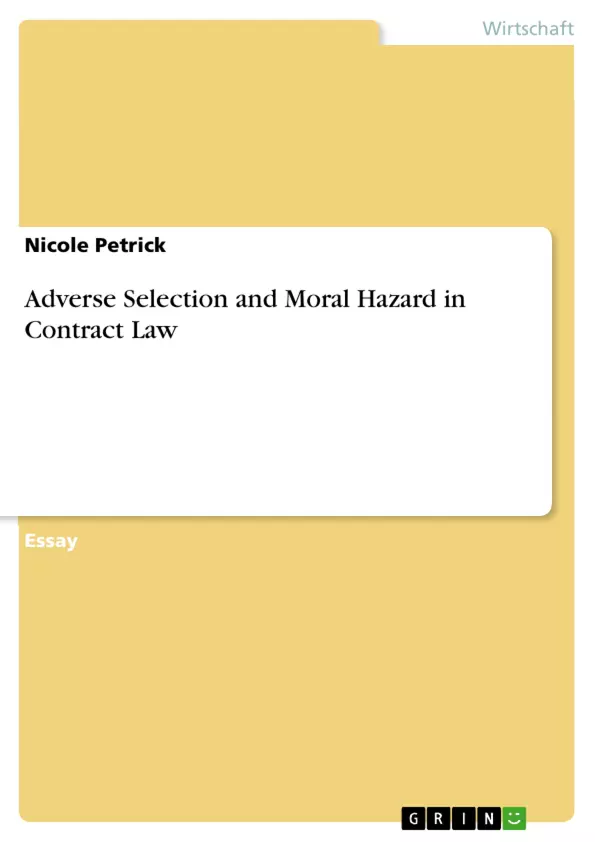Legal and economical interpretations of contract, contract law and contract theory, asymmetric information, adverse selection and moral hazard. Paper explains negative effects of adverse selection and moral hazard for the case of transaction costs and incomplete contracts and describes incentives to avoid adverse selection and moral hazard, such as signaling and deductibles as well as indemnity contracts and valued contracts.
Inhaltsverzeichnis
- Introduction
- Legal and economical interpretations
- Contract, contract law and contract theory
- Asymmetric information
- Adverse selection
- Moral Hazard
- Negative effects of adverse selection and moral hazard
- Transaction costs
- Incomplete contracts
- Incentives to avoid adverse selection and moral hazard
- Signaling
- Deductible provision
- Indemnity contracts versus valued contracts
- Summary
- References
Zielsetzung und Themenschwerpunkte
Dieser Essay befasst sich mit dem Thema der adversen Selektion und des moralischen Risikos im Vertragsrecht. Er analysiert die Auswirkungen dieser beiden Phänomene auf die Effizienz von Verträgen und die Preisbildung. Der Essay beleuchtet die rechtlichen und ökonomischen Interpretationen von Verträgen, asymmetrischen Informationen, adverser Selektion und moralischem Risiko. Darüber hinaus werden die negativen Auswirkungen dieser Phänomene auf Transaktionskosten und unvollständige Verträge untersucht. Schließlich werden verschiedene Anreize und Mechanismen zur Vermeidung oder Minimierung von adverser Selektion und moralischem Risiko vorgestellt.
- Definition und Analyse von Verträgen, Vertragsrecht und Vertragstheorie
- Erklärung von asymmetrischen Informationen, adverser Selektion und moralischem Risiko
- Untersuchung der negativen Auswirkungen auf Transaktionskosten und unvollständige Verträge
- Vorstellung von Anreizen und Mechanismen zur Vermeidung oder Minimierung von adverser Selektion und moralischem Risiko
- Zusammenfassung der wichtigsten Erkenntnisse und Schlussfolgerungen
Zusammenfassung der Kapitel
Die Einleitung führt in das Thema der adversen Selektion und des moralischen Risikos im Vertragsrecht ein. Sie definiert den Begriff des Vertrags aus ökonomischer Sicht und erläutert die Bedeutung von Anreizen, unvollständigen Verträgen und Transaktionskosten. Die Einleitung stellt die beiden Phänomene der adversen Selektion und des moralischen Risikos vor und beschreibt ihre Auswirkungen auf die Effizienz von Verträgen.
Der zweite Teil des Essays befasst sich mit den rechtlichen und ökonomischen Interpretationen von Verträgen, asymmetrischen Informationen, adverser Selektion und moralischem Risiko. Er definiert den Begriff des Vertrags, des Vertragsrechts und der Vertragstheorie und erläutert die Bedeutung von asymmetrischen Informationen für die Entstehung von adverser Selektion und moralischem Risiko.
Der dritte Teil des Essays untersucht die negativen Auswirkungen von adverser Selektion und moralischem Risiko auf Transaktionskosten und unvollständige Verträge. Er zeigt auf, wie diese Phänomene zu Ineffizienzen führen können und wie sie die Kosten der Vertragsgestaltung und -durchsetzung erhöhen.
Der vierte Teil des Essays stellt verschiedene Anreize und Mechanismen zur Vermeidung oder Minimierung von adverser Selektion und moralischem Risiko vor. Er diskutiert die Bedeutung von Signalling, Selbstbeteiligungen und der Unterscheidung zwischen Entschädigungsverträgen und Wertverträgen.
Schlüsselwörter
Die Schlüsselwörter und Schwerpunktthemen des Textes umfassen Vertragsrecht, adverse Selektion, moralisches Risiko, asymmetrische Informationen, Transaktionskosten, unvollständige Verträge, Signalling, Selbstbeteiligungen, Entschädigungsverträge und Wertverträge. Der Text analysiert die Auswirkungen von adverser Selektion und moralischem Risiko auf die Effizienz von Verträgen und die Preisbildung und stellt verschiedene Mechanismen zur Vermeidung oder Minimierung dieser Phänomene vor.
- Citation du texte
- Nicole Petrick (Auteur), 2005, Adverse Selection and Moral Hazard in Contract Law , Munich, GRIN Verlag, https://www.grin.com/document/110788



